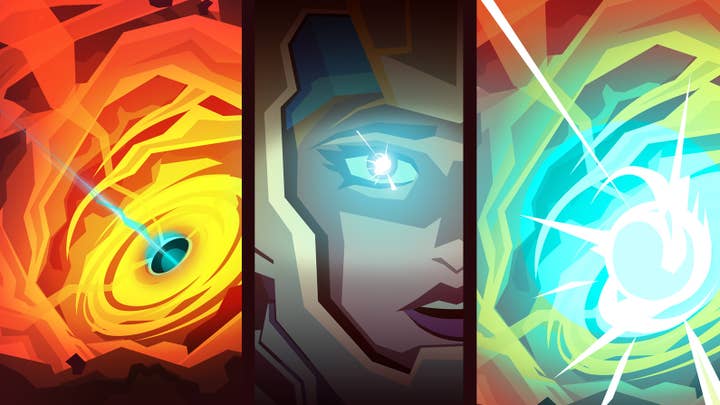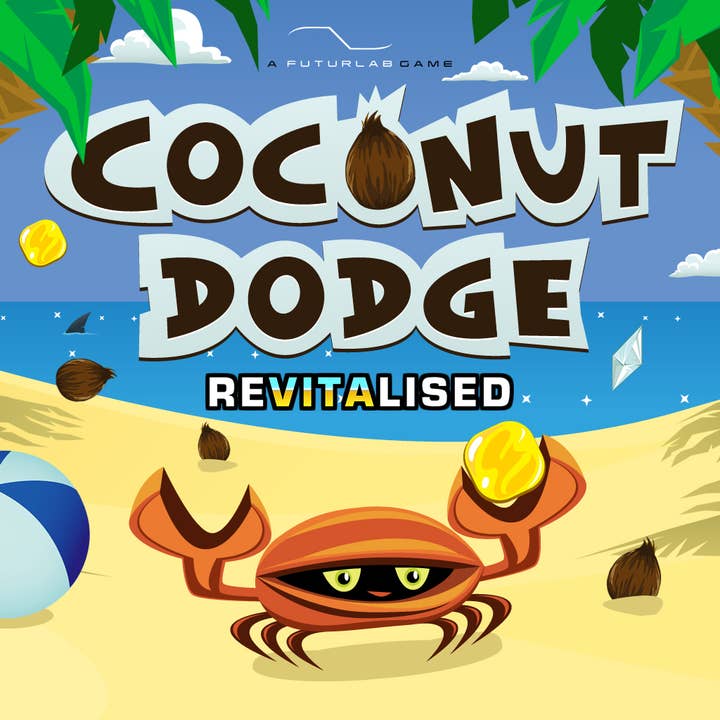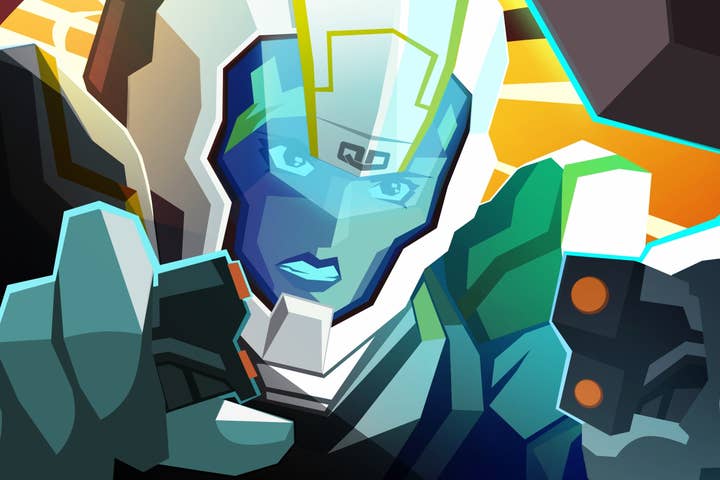Futurlab: Sony is a "New breed of business development"
The Velocity team on the journey from Coconut Dodge to Shuhei Yoshida
With the ongoing exchanges of fire between the big-gun PR departments of Sony and Microsoft, it's been easy to reduce the two companies to faceless corporations, homogenised marketing machines inexorably worming their way into our hearts and wallets.
For every game there is a team of developers, but for every team of developers there's also a team of people working to make the process of publishing as smooth as possible. Recently, the relative ease and efficiency of this process has become a very public weapon in the ongoing war for the living-room, as the recruitment of indies has become ever-more important - not only for depth and breadth of each machine's offering, but increasingly the public's perception of the platform holders' ethos too.
More and more, selling the publishing process to developers is becoming as vital as selling the console itself to consumers - and it's a war which Sony seems to be winning, despite a much improved opposition.
Brighton-based Futurlab is in many ways the archetypal poster child for the process which Sony is selling. Currently the studio's flagship game is the excellent Velocity - a vertically-scrolling space shooter with clever puzzle elements and a distinctly innovative style, the sort of experimental endeavour which just seems to be naturally more at home on Sony's platforms. The small team has worked exclusively on Sony machines for many years now, graduating through the Minis program and Sony mobile to full digital releases on PS3 and Vita, and a duo of PS4 titles announced on stage during Sony's Gamescom briefing. Co-founders Kirsty Rigden and James Marsden are passionate and evangelical of the whole journey, and they're not locked into any sort of exclusivity arrangements at all - so what's the magic ingredient?
In reality, it's really quite simple. "They have been really nice to us, they are really, really good to work with," says Rigden. "They take the biggest risks, don't they?"
"I am a self confessed Sony fan boy," adds Marsden with a grin, before adding a caveat. "Fan boy is quite a negative connotation, I am a loyal supporter. It is just because, the games, the kind of games I enjoy playing are on PlayStation.
"They take risks creatively, Journey is a great example, it was Jenova Chen that got me into pursuing Sony, working with Sony in a big way, because he was supported straight out of university. With that support he was able to go forward and challenge conventions, make a game about wind and petals, you know? By a company that is considered hardcore, and then Journey - which has been the best game for them PSN."
That's a bit chicken and egg, though. Those games didn't come about by chance - there had to be a culture which encouraged them. For Futurlab, that culture permeates the developer-facing staff right to the very top but is most apparent when dealing with the man responsible for signing Luftrausers, Hotline Miami and Velocity 2X to the Vita: Sony Strategic Content's Shahid Ahmad. Initially, says, Marsden, it took a bit of work to get noticed, but once they were on Ahmad's radar, things were never the same again.
"It was Jenova Chen that got me into pursuing Sony, working with Sony in a big way, because he was supported straight out of university"
"For Coconut Dodge, Shahid was our account manager, and we had obviously come from flash. He had probably just taken one look at Coconut Dodge and thought, not really worth my time. I can't blame him for that. But, it was really hard to get him on the phone, we would email him and he'd get back to us. At the time, I just thought this was how it was going to be, as we were making something very small, this guy is probably very busy and going off to see Naughty Dog, or whatever it is. But, there came a time where the Sony TPR net (Third Party Relations Website), had an error. I emailed him saying that we were having this problem with the website and could he look into it and I sent him a screen grab of what I could see.
"There wasn't actually an error, as such, just a blank page were there should be some content. Then he wrote back saying if there was just a black page then that was an error. I was like, okay this guy could be quite difficult, but didn't think anything of it. Then about ten mins later I got an email, from another guy, with Shahid copied in, saying could you please send us a screen grab of what you are seeing. So, I was like, for God's sake. So I took a screen grab of that website with Shahid's picture there and I cut his picture out and replaced it with Ronald MacDonald. I sent that as the screen grab and said - this is what I see, knock yourself out.
"A few minutes later I got an email back from Shahid saying your account has been cancelled. I replied saying - do you mean that you have shut down the developer account and fixed the problem? To put out the flames a little bit. He replied saying 'No - all of your accounts have been cancelled until further notice, until you can send a more appropriate picture of your account manger.' So, I was like, oh dear...so I took the screen grab again and replaced that picture of Ronald MacDonald with a picture of the Terminator...
"Every bit of our correspondence after that had some sort of joke about the Terminator, but he would be on the end of a phone. We had to use being cheeky to cut through, and ever since then he has had a bit of a soft spot for Futurlab, I think. So when we came out with Velocity and I sent him a code - said have a go. He got back in touch and said - 'absolutely love this. You have done an amazing job here, just the three of you. We are just running something called PlayStation Mobile at the moment, would you like to get involved? Can you do something slick and Futurlabby for mobile?' We said 'we can't do one game we can do three games!' So we went up to London and we pitched him the three titles."

"One of them, BeatSlider, we had already been working on before," Rigden says, taking over. "So, about 2010, asked us to come up with an idea for what was going to be PS Mobile. So, they picked up BeatSlider, we were working on that with them, and we got to Beta and we were just waiting on their PSN library so we could hook it up etc. And then, they kind of... I don't know what exactly happened. Vita, was coming out, so they thought it was going to be a launch title for Vita...then they decided that it wouldn't be suitable, which it wouldn't have been. So it kind of got put in the shelf a little bit, PS Mobile or it was taking a back seat or something. So that was one of the ones that we were able to pitch to them and then London could pick it up off Liverpool. So, Sony actually own that one. The other two are ours."
Marsden pitches back in, the conversation flitting between the two of them in a way which makes their easy relationship even more apparent. "When we met Shahid at Dev-Con, he said he would like to commission a sequel to Velocity. Which was, our goal really, to grab someone's attention and to get some cash from them. So, we talked about what we might want a sequel to look like. I also showed a video of Coconut Dodge, and after he saw that...that was when he was forming his vision for getting as many indie developers on Vita as possible, to kind of grow a development community.
"He said that we should do a HD version of Velocity and an HD version of Coconut Dodge as well. He said he wanted to just get all of the good content that has been made on Sony's platforms, on PSP, on Minis and elsewhere on other platforms, and just print it all to Vita. So then, suddenly, we were making a sequel of Velocity, and HD version of Velocity and an HD version of Coconut Dodge on Vita and Surge on Vita. So we have had four projects to do this year."
Futurlab is ten staff strong now, but when the work ramped up the team was tiny, only four people - "technically there was just one," Rigden explains, "the rest of us were all just contractors. Three coders contracted and then me, and another audio guy contracted." Within a few years that small team would be getting a visit from the President of Sony's Worldwide Studios Shuhei Yoshida. Even better, he'd clearly spent some time playing their game.
"Shahid and his department are a new breed of business development"
"Dave our production assistant saw he was at Develop and said we should invite him over," Marsden tells me, clearly chuffed. "So we thought, why not? We told him we were five minutes away and he said, OK. We showed him what we were working on and the first thing he said was 'why did you put a save button on the main menu in velocity Ultra? It should always auto-save!' He'd actually been playing our game! It was nice to meet him."
Whilst they pair might have had their fair share of celebrity support, it's clearly Ahmad and his Strategic Content team which have been the facilitators of the team's journey.
"Shahid and his department are a new breed of business development," James says emphatically. Rigden agrees, taking takes time to explain why a relationship of mutual respect works more effectively than one of contractual obligation.
"I think, ironically, when you don't make someone exclusive, they kind of...well I sort of feel like we don't feel like we have to work with them, it's our choice to want to work with them. So it kind of works in their favour as well. We really appreciate and like what they are doing, we like their attitude to things and therefore we want to continue to work with people with that attitude.
"Shahid calls it 'support, steer, don't interfere', says Marsden, grimacing good-naturedly at the cheesy slogan. "That is his little phrase, and that is exactly what they do. But, yes, we are independent. We would like to be more financially independent, hopefully that will come with sales of our game. But, for the moment we are working with Sony, and we are quite happy working with Sony. We are really excited to be working on the PS4 and there other platforms out there. I see Sony as really investing in the medium in a big way, I don't see that happening anywhere else, really."
One of the great, and largely unsung, features of Sony's offering this generation has been PS+ - a system which seems perfectly pitched at introducing stand-out indies to a wider audience and building an ongoing relationship with platform. Microsoft is emulating that with its free-game offer for Gold subscribers, too, so it's definitely a hit for consumers, but how is it from the developer side?

"They come to you with a deal," says Rigden. "They say, we'll give you this much money if we can have the game for free, or exclusive, or money off, or a combination. There are a lot of different ways you can do it. The amount of money that they'll suggest will be relevant to the package."
"They call it a guaranteed sales buyout," Marsden intervenes. "It's like looking at guaranteed downloads - you discuss a deal up front and decide if it's worth it. For us it was less about money and more about exposure, especially with a sequel coming."
Back to Rigden again, the two almost finishing each others sentences. "The Minis title was over 120,000 downloads. We don't know if all those people played it, or if they'd have bought it otherwise, but we do at least know that they all know it exists, which is amazing. I'm not sure what figures we would have done without it. We get a chunk of cash, that's nice, thank you, but so many people get to know about us and play our games. It's the ultimate demo, really. We're very much looking at things long term, not just looking to make a quick buck on sales."
Whilst we're on the subject of a quick buck, what about business models? Futurlab's games are bite-sized and fast-paced, offering variety in small packages - surely perfect for drip-fed delivery in monetised chunks? Does that fit with the company's ethos of polished, high-quality games?
"I don't like free-to-play games, as a consumer," says Rigden emphatically. She pauses, then explains. "It's only in the same way that I don't like arcade games. My mum drilled it in to me that it's pointless to pour money into something you get nothing back out of, so I've still got that mindset. It's not because I think they're terrible or bad. I'm just not interested personally. I'd have no idea about how to go about designing one.
"We're not trying to be millionaires, we just want jobs that we like, to be able to pay the rent."
Her co-founder looks far from enthused by the prospect, too. "The big supporters of F2P say 'yes the model is abused, but it doesn't have to be like that'," he muses. "I completely disagree. I think that a piece of quality design requires that all the pieces of that design be pointed in the right direction. If your goal is to extract money, then that's your design priority and everything you do, every sound effect, every animation has to be judged on whether it contributes to that design goal or not.
"A lot of people in the F2P debate will say there's no reason a F2P mobile game can't be a stunning piece of art at the same time. I completely reject that. There's a fundamental principle that if you're trying to design an experience to thrill and delight someone then getting money of them whilst that's going on doesn't work. Both of those goals have form defining-aspects. In order to satisfy either, the other has to suffer."

